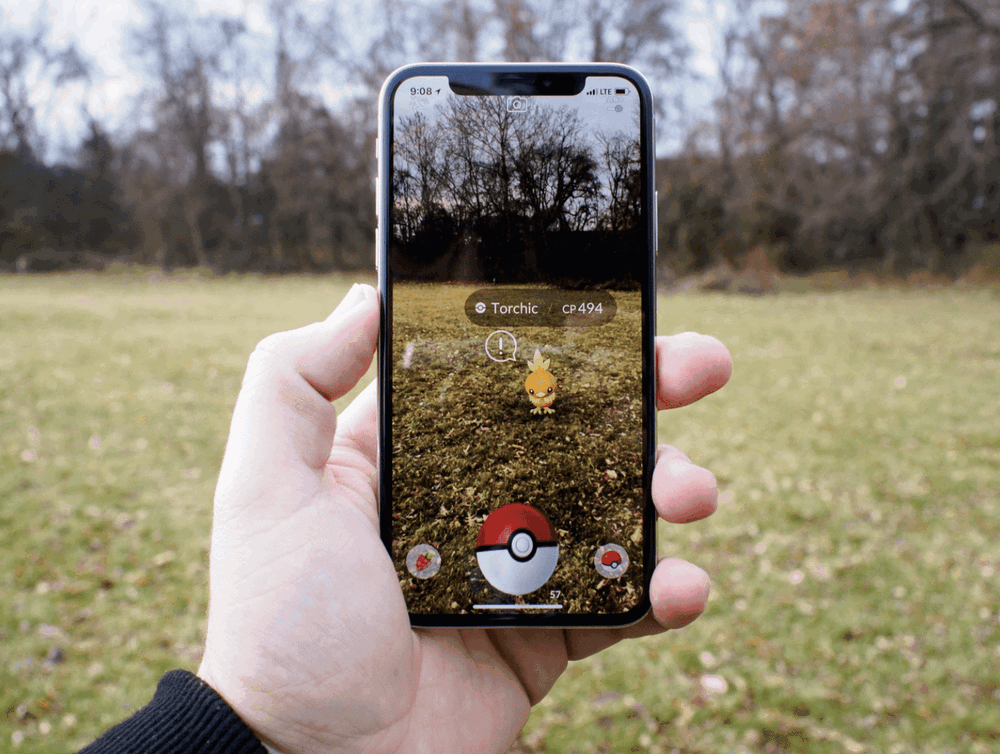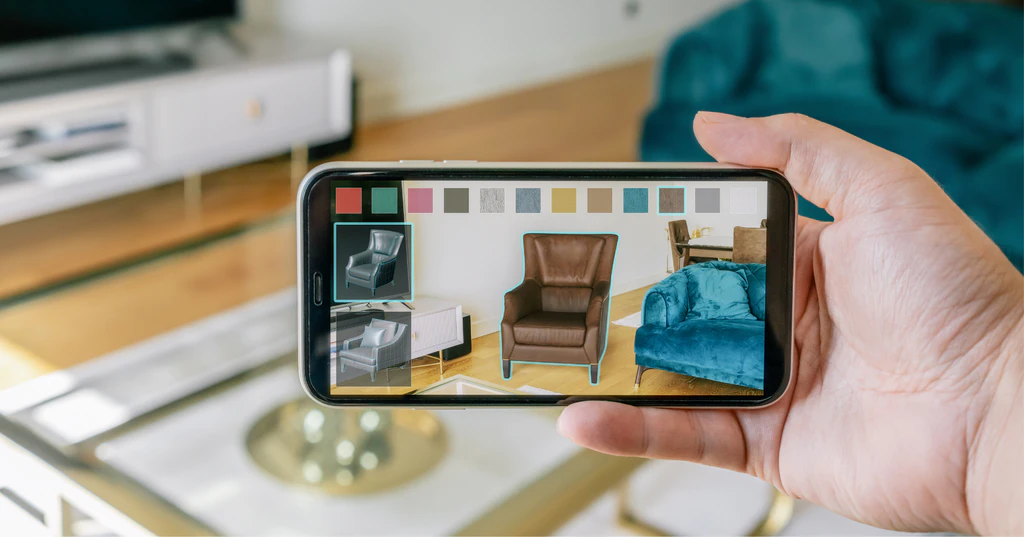.jpg?2026-02-17T14:47:30.411Z)
When Leroy Merlin ran out of hands, InAppStory became the extra ones

Exploring the Revolutionary Impact of AR in Mobile Apps and Marketing
Mark Polskii
Author @ InAppStory
The journey of AR technology from its conceptual inception to its current widespread application is a testament to rapid technological progress. Early AR experiments were limited by hardware capabilities and were largely confined to research labs. However, the advent of powerful smartphones equipped with advanced sensors and high-speed internet has catapulted AR into mainstream use. Today, AR features in mobile apps not only offer immersive gaming experiences but also practical applications in education, healthcare, and retail, making information more accessible and experiences more engaging.
The impact of AR on marketing is equally profound. Brands are leveraging AR to create interactive and engaging campaigns that allow consumers to experience products in entirely new ways. From trying on virtual makeup to visualizing furniture in their homes before making a purchase, AR is adding a new dimension to consumer engagement and decision-making processes.
As we stand on the brink of a new era in mobile computing and digital marketing, AR technology promises to further blur the lines between the physical and digital worlds. This article explores the revolutionary role of AR in mobile apps and marketing, highlighting its potential, challenges, and future directions. Through this lens, we will delve into how AR is not just changing the way we interact with our devices but also how businesses connect with their customers, marking a significant shift in the digital landscape.
AR in Mobile Apps
The integration of Augmented Reality (AR) into mobile applications has been nothing short of transformative, opening up a plethora of opportunities across various sectors. AR-enabled mobile apps go beyond mere entertainment, touching upon education, healthcare, real estate, and more, by offering immersive and interactive experiences that were once deemed futuristic.

Overview of AR-Enabled Mobile Apps Across Various Industries
- Gaming: The gaming industry was among the first to harness the potential of AR, offering gamers an immersive experience that blends the virtual and real worlds. Pokémon GO, for example, became a global phenomenon by allowing players to catch virtual Pokémon in real-world locations, using their smartphone’s camera and GPS.
- Education: AR in education has revolutionized the learning experience, making it more engaging and interactive. Apps like Anatomy 4D transform the way students learn about the human body, allowing them to explore anatomical structures in three dimensions by simply pointing their device’s camera at a target image.
- Healthcare: In healthcare, AR apps assist professionals and patients alike. For instance, AccuVein uses AR to visualize veins, making venipuncture easier and less painful. Such applications not only improve patient care but also enhance the training of healthcare professionals.
- Retail and E-commerce: Retailers are using AR to offer customers a "try before you buy" experience. The IKEA Place app, for example, allows users to visualize how furniture would look in their home before making a purchase, significantly enhancing customer satisfaction and reducing return rates.
Case Studies of Successful AR Mobile Apps
- Pokémon GO: Launched in 2016, Pokémon GO’s use of AR to create a game that interacted with the real world led to its viral success, showcasing the potential of AR in creating engaging user experiences.
- IKEA Place: By allowing customers to see how furniture would fit and look in their actual space, IKEA Place has not only improved the shopping experience but also set a benchmark for AR in retail.
The Impact of AR on User Engagement and App Usability
AR has significantly increased user engagement by making mobile apps more interactive and enjoyable. Users are more likely to spend time on an app that offers an immersive experience, leading to higher retention rates. Moreover, AR improves app usability by providing intuitive and interactive ways to explore information, thereby making apps more accessible and easier to navigate.
Challenges and Considerations in Developing AR Apps
Developing AR apps comes with its set of challenges. High-quality AR experiences require advanced hardware and software, raising concerns about device compatibility and user accessibility. Additionally, creating intuitive user interfaces for AR apps requires careful design and consideration to ensure a seamless and enjoyable user experience. Privacy and security also become paramount, as AR apps often require access to cameras and location data.
Technological Advancements and Future Directions
The integration of Augmented Reality (AR) in mobile apps and marketing has been significantly influenced by rapid technological advancements. These developments not only enhance the capabilities of AR but also expand its potential applications. This section explores recent technological advancements driving AR development, discusses the future potential of AR in various sectors, and considers ethical and privacy implications.
Recent Technological Advancements Driving AR Development
- 5G Connectivity: The rollout of 5G networks has been a game-changer for AR technology. With higher speeds and lower latency, 5G enhances the performance of AR applications, allowing for more complex and interactive AR experiences that were previously not possible due to bandwidth limitations.
- Artificial Intelligence and Machine Learning: AI and machine learning algorithms have become integral to improving AR experiences, enabling more accurate and real-time object recognition, scene understanding, and personalization. These technologies help AR systems to better interpret the physical world and adjust digital overlays dynamically.
- Advances in Hardware: The development of more powerful and energy-efficient processors, along with improvements in cameras and sensors in smartphones and AR glasses, has greatly enhanced the feasibility and quality of AR experiences. High-resolution displays and advanced tracking capabilities have made AR more immersive and realistic.
The Potential of AR in Transforming Ecommerce and Retail

Ecommerce and retail stand at the forefront of industries poised for transformation through AR. With technologies like virtual try-on for clothes and accessories, and AR-powered shopping experiences that allow customers to visualize products in their own space, AR is set to redefine the shopping experience. These advancements not only aim to increase consumer engagement and confidence but also to reduce return rates by providing a more accurate sense of product fit and appearance.
Future Trends in AR Mobile Apps and Marketing Strategies
- Spatial Computing: As AR technology advances, the concept of spatial computing—where digital content is not just overlaid on the real world but is also contextually aware and interactive—will become more prevalent. This will enable more sophisticated and intuitive interactions between users and their environment.
- AR-Powered Virtual Events: With the increasing demand for virtual and hybrid event formats, AR offers a unique opportunity to enhance online event experiences, making them more engaging and interactive for attendees.
- Personalization and AI-Driven Content: Future AR applications will likely leverage AI to offer highly personalized experiences, adjusting content in real-time based on user preferences, behaviors, and surroundings.
Ethical Considerations and Privacy Issues
As AR technology continues to evolve, ethical considerations and privacy issues become increasingly important. The use of AR involves collecting and processing vast amounts of data, including sensitive personal information. Ensuring user consent, safeguarding data privacy, and addressing potential biases in AI algorithms are crucial challenges that developers and marketers must address to build trust and ensure the responsible use of AR.
Conclusion
The transformative impact of Augmented Reality (AR) on mobile apps and marketing represents a significant leap forward in how technology can enhance, alter, and enrich our daily lives and interactions with the digital world. Through immersive experiences that blend the digital and physical realms, AR has opened up new avenues for engagement, education, entertainment, and commerce. From enabling gamers to chase virtual creatures in real-world environments to allowing consumers to visualize products in their space before purchase, AR has proven its vast potential and versatility.
The exploration of AR in mobile apps has shown that this technology is not just a fleeting trend but a fundamental shift in app development and user interaction. It has the power to make educational content more accessible, healthcare more precise, and retail more personalized and engaging. Meanwhile, in marketing, AR offers a unique opportunity to create immersive and interactive campaigns that captivate audiences, fostering a deeper connection between brands and consumers.

